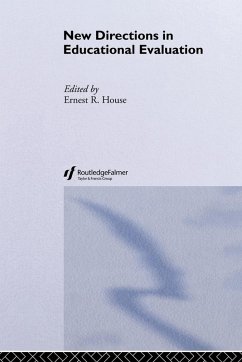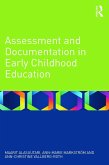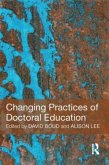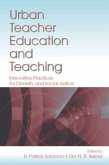Ernest R. House
New Dir. In Education Evaluati
Ernest R. House
New Dir. In Education Evaluati
- Broschiertes Buch
- Merkliste
- Auf die Merkliste
- Bewerten Bewerten
- Teilen
- Produkt teilen
- Produkterinnerung
- Produkterinnerung
First published in 2004. Routledge is an imprint of Taylor & Francis, an informa company.
Andere Kunden interessierten sich auch für
![New Dir. In Education Psycholo New Dir. In Education Psycholo]() New Dir. In Education Psycholo59,99 €
New Dir. In Education Psycholo59,99 €![Values in Higher Education Teaching Values in Higher Education Teaching]() Tony HarlandValues in Higher Education Teaching53,99 €
Tony HarlandValues in Higher Education Teaching53,99 €![The Future Agenda for Internationalization in Higher Education The Future Agenda for Internationalization in Higher Education]() The Future Agenda for Internationalization in Higher Education51,99 €
The Future Agenda for Internationalization in Higher Education51,99 €![The Death of Progressive Education The Death of Progressive Education]() Roy LoweThe Death of Progressive Education67,99 €
Roy LoweThe Death of Progressive Education67,99 €![Assessment and Documentation in Early Childhood Education Assessment and Documentation in Early Childhood Education]() Maarit AlasuutariAssessment and Documentation in Early Childhood Education72,99 €
Maarit AlasuutariAssessment and Documentation in Early Childhood Education72,99 €![Changing Practices of Doctoral Education Changing Practices of Doctoral Education]() David Boud / ALISON LEE (eds.)Changing Practices of Doctoral Education59,99 €
David Boud / ALISON LEE (eds.)Changing Practices of Doctoral Education59,99 €![Urban Teacher Education and Teaching Urban Teacher Education and Teaching]() Urban Teacher Education and Teaching61,99 €
Urban Teacher Education and Teaching61,99 €-
-
-
First published in 2004. Routledge is an imprint of Taylor & Francis, an informa company.
Produktdetails
- Produktdetails
- Verlag: Routledge
- Seitenzahl: 272
- Erscheinungstermin: 6. März 1986
- Englisch
- Abmessung: 234mm x 156mm x 15mm
- Gewicht: 418g
- ISBN-13: 9781850000471
- ISBN-10: 1850000476
- Artikelnr.: 22168986
- Herstellerkennzeichnung
- Libri GmbH
- Europaallee 1
- 36244 Bad Hersfeld
- gpsr@libri.de
- Verlag: Routledge
- Seitenzahl: 272
- Erscheinungstermin: 6. März 1986
- Englisch
- Abmessung: 234mm x 156mm x 15mm
- Gewicht: 418g
- ISBN-13: 9781850000471
- ISBN-10: 1850000476
- Artikelnr.: 22168986
- Herstellerkennzeichnung
- Libri GmbH
- Europaallee 1
- 36244 Bad Hersfeld
- gpsr@libri.de
Ernest R. House
Part 1 Introduction: Evaluation and Legitimacy
Chapter 1 Evaluation and Legitimacy, Ernest R.House
Part 2 New Analyses: Issues and Metaphors
Chapter 2 Introduction
Chapter 3 The Conceptualization of Educational Evaluation: An Analytical Review of the Literature, DavidNevo
Chapter 4 How We Think about Evaluation, Ernest R.House
Part 3 Radical Propositions: Fusing Fact and Value
Chapter 5 Introduction
Chapter 6 Evaluation as a Paradigm for Educational Research, MichaelScriven
Chapter 7 The Feminist Evaluator Gill Kirkup Open University
Part 4 Naturalistic Evaluation: Acting from Experience
Chapter 8 Introduction
Chapter 9, Robert E.Stake
Chapter 10 Three Good Reasons for Not Doing Case Studies in Curriculum Research, RobWalker
Chapter 11 Seven Principles for Programme Evaluation in Curriculum Development and Innovation, StephenKemmis
Part 5 Part Icipatory Evaluation: The Stakeholder Approach
Chapter 12 Introduction
Chapter 13 The Stakeholder Approach to Evaluation: Origins and Promise, Carol H.Weiss
Chapter 14 The Evaluation of Push/Excel: A Case Study, EleanorFarrar, ErnestHouse
Chapter 15 Toward the Future of Stakeholder Approaches in Evaluation, Carol H.Weiss
Part 6 Teachers and Evaluation: Learning to Labor
Chapter 16 Introduction
Chapter 17 Teacher Evaluation in the Organizational Context: A Review of the Literature, LindaDarling-Hammond, Arthur E.Wise, Sara R.Pease
Chapter 1 Evaluation and Legitimacy, Ernest R.House
Part 2 New Analyses: Issues and Metaphors
Chapter 2 Introduction
Chapter 3 The Conceptualization of Educational Evaluation: An Analytical Review of the Literature, DavidNevo
Chapter 4 How We Think about Evaluation, Ernest R.House
Part 3 Radical Propositions: Fusing Fact and Value
Chapter 5 Introduction
Chapter 6 Evaluation as a Paradigm for Educational Research, MichaelScriven
Chapter 7 The Feminist Evaluator Gill Kirkup Open University
Part 4 Naturalistic Evaluation: Acting from Experience
Chapter 8 Introduction
Chapter 9, Robert E.Stake
Chapter 10 Three Good Reasons for Not Doing Case Studies in Curriculum Research, RobWalker
Chapter 11 Seven Principles for Programme Evaluation in Curriculum Development and Innovation, StephenKemmis
Part 5 Part Icipatory Evaluation: The Stakeholder Approach
Chapter 12 Introduction
Chapter 13 The Stakeholder Approach to Evaluation: Origins and Promise, Carol H.Weiss
Chapter 14 The Evaluation of Push/Excel: A Case Study, EleanorFarrar, ErnestHouse
Chapter 15 Toward the Future of Stakeholder Approaches in Evaluation, Carol H.Weiss
Part 6 Teachers and Evaluation: Learning to Labor
Chapter 16 Introduction
Chapter 17 Teacher Evaluation in the Organizational Context: A Review of the Literature, LindaDarling-Hammond, Arthur E.Wise, Sara R.Pease
Part 1 Introduction: Evaluation and Legitimacy
Chapter 1 Evaluation and Legitimacy, Ernest R.House
Part 2 New Analyses: Issues and Metaphors
Chapter 2 Introduction
Chapter 3 The Conceptualization of Educational Evaluation: An Analytical Review of the Literature, DavidNevo
Chapter 4 How We Think about Evaluation, Ernest R.House
Part 3 Radical Propositions: Fusing Fact and Value
Chapter 5 Introduction
Chapter 6 Evaluation as a Paradigm for Educational Research, MichaelScriven
Chapter 7 The Feminist Evaluator Gill Kirkup Open University
Part 4 Naturalistic Evaluation: Acting from Experience
Chapter 8 Introduction
Chapter 9, Robert E.Stake
Chapter 10 Three Good Reasons for Not Doing Case Studies in Curriculum Research, RobWalker
Chapter 11 Seven Principles for Programme Evaluation in Curriculum Development and Innovation, StephenKemmis
Part 5 Part Icipatory Evaluation: The Stakeholder Approach
Chapter 12 Introduction
Chapter 13 The Stakeholder Approach to Evaluation: Origins and Promise, Carol H.Weiss
Chapter 14 The Evaluation of Push/Excel: A Case Study, EleanorFarrar, ErnestHouse
Chapter 15 Toward the Future of Stakeholder Approaches in Evaluation, Carol H.Weiss
Part 6 Teachers and Evaluation: Learning to Labor
Chapter 16 Introduction
Chapter 17 Teacher Evaluation in the Organizational Context: A Review of the Literature, LindaDarling-Hammond, Arthur E.Wise, Sara R.Pease
Chapter 1 Evaluation and Legitimacy, Ernest R.House
Part 2 New Analyses: Issues and Metaphors
Chapter 2 Introduction
Chapter 3 The Conceptualization of Educational Evaluation: An Analytical Review of the Literature, DavidNevo
Chapter 4 How We Think about Evaluation, Ernest R.House
Part 3 Radical Propositions: Fusing Fact and Value
Chapter 5 Introduction
Chapter 6 Evaluation as a Paradigm for Educational Research, MichaelScriven
Chapter 7 The Feminist Evaluator Gill Kirkup Open University
Part 4 Naturalistic Evaluation: Acting from Experience
Chapter 8 Introduction
Chapter 9, Robert E.Stake
Chapter 10 Three Good Reasons for Not Doing Case Studies in Curriculum Research, RobWalker
Chapter 11 Seven Principles for Programme Evaluation in Curriculum Development and Innovation, StephenKemmis
Part 5 Part Icipatory Evaluation: The Stakeholder Approach
Chapter 12 Introduction
Chapter 13 The Stakeholder Approach to Evaluation: Origins and Promise, Carol H.Weiss
Chapter 14 The Evaluation of Push/Excel: A Case Study, EleanorFarrar, ErnestHouse
Chapter 15 Toward the Future of Stakeholder Approaches in Evaluation, Carol H.Weiss
Part 6 Teachers and Evaluation: Learning to Labor
Chapter 16 Introduction
Chapter 17 Teacher Evaluation in the Organizational Context: A Review of the Literature, LindaDarling-Hammond, Arthur E.Wise, Sara R.Pease









